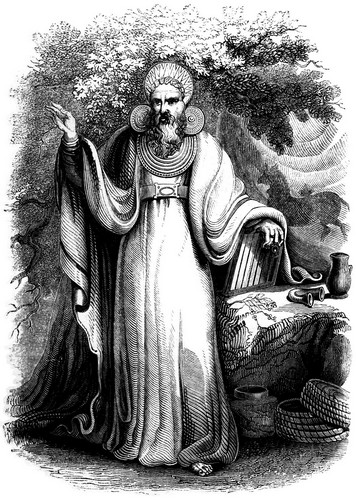
LIBRARY
© & ® Varg Vikernes. Do not reproduce, respect the copyrights.
Paganism: Part XVI - The White God
 Easter is approaching yet again. Every year we experience this return of the Sun, and although the religious content has not been the same all along we have celebrated his return religiously (and lately often non-religiously) since the beginning of man. At first he was merely seen as a spirit, a shining round object in the sky moved about by the wind. Much, much later this impersonal spirit went through an anthropomorphism, and thus our solar deity came to be.
Easter is approaching yet again. Every year we experience this return of the Sun, and although the religious content has not been the same all along we have celebrated his return religiously (and lately often non-religiously) since the beginning of man. At first he was merely seen as a spirit, a shining round object in the sky moved about by the wind. Much, much later this impersonal spirit went through an anthropomorphism, and thus our solar deity came to be.
The ancient man had a cyclic view of life. There was no beginning and no end; only perpetual cyclic movement. The Sun – whether it was a spirit or a deity – was born every morning, lived every day, died every evening and had to go through the mysterious underworld every night, and it had always been like that. Ancient man – who was just as intelligent as we are, but even more ignorant – was always very afraid the Sun would not return from the underworld, so he did as best he could to ensure its return. He became a sorcerer, ensuring the return of the Sun every day with increasingly complicated spell; chants, imitations, verses and the carving of symbols into rocks. But – alas! – just like the Sun lost its power when it set in the west it also lost its power in the autumn, when the leaves fell from the oak trees. Howling winds and cold rain dominated the sky, and man's life became very hard. What if the Sun would never regain its strength? What then? Would winter come and never go away?
The power of the Sun could be found in the wood of the trees. It had been transferred to the trees from the Sun in the sky via the lightning, the sorcerer believed, and could be extracted for proper use by the sorcerers; he could build great bonfires imitating the power of the Sun, providing light and warmth to man when needed. When the trees apparently died (i. e. lost their leaves) in the autumn the sorcerers climbed the most powerful of all the trees, the oak, and cut down the only healthy, green and fertile branch left there; the mistletoe. He believed that all the power of the oak/Sun had withdrawn from the trunk and other branches to this tiny growth, and because of that the mistletoe could be used as a wand of concentrated solar power. This was the key to the power of the world, and the sorcerer became omnipotent! He was both king and god to his people!
The sorcerer ruled Europe for tens of thousands of years, until the end of the Neolithic Age or the Bronze Age, when sorcery to a large extent was replaced (or rather supplemented) by religion, and the sorcerer was exchanged by the priest. When the hooded sorcerer cut down the mistletoe from the oak tree the new priest cursed him, and accused him of murdering the beloved Belus; the deity of the oak tree and the power of the Sun. The oak god himself was invulnerable to harm, because all his power had withdrawn to the mistletoe. His life force was in this golden bough, but was taken away by the sorcerer. This was, the priest believed, the very reason winter came in the first place and covered the lands in snow and frost. Belus was in other words murdered by the hooded sorcerer!
By the time of the Viking Age, several thousand years later, this had become a myth about a hooded deity, Höðr ("hood"), murdering the fair and innocent Baldur ("strong and round being") with the mistletoe. Naturally, the mistletoe had been given to him by Loki ("lightning"), the spirit/deity transferring the mistletoe and the power of the Sun to the oak tree. This mighty branch, alias Jörmungandr ("animated staff") and Bölþorn ("bad branch", "bad thorn"), was cast down to Earth and the oak tree when Þórr ("thunder") hit it's head with a hammer (original meaning of the word is "stone"). And that's where the hooded sorcerer found it...
Enlightenment can still be found – in Baldur, alias Belus; the White God, the deity of innocence, purity, enlightenment and secrets. The runes are carved onto his tongue. Hope you lords, that he speaks to you. Hope you ladies, that he kisses you. Belus will wake you up from your thousand-year-sleep. The wall of thorns can be broken.
Easter draws near, and sorcery is still real; in words and in music, and in the strong mind.
Source: "Sorcery and Religion in Ancient Scandinavia"
Varg "the Villain" Vikernes
(11th of March 2010)
This text is written exclusively for www.burzum.org
In other languages: Italiano